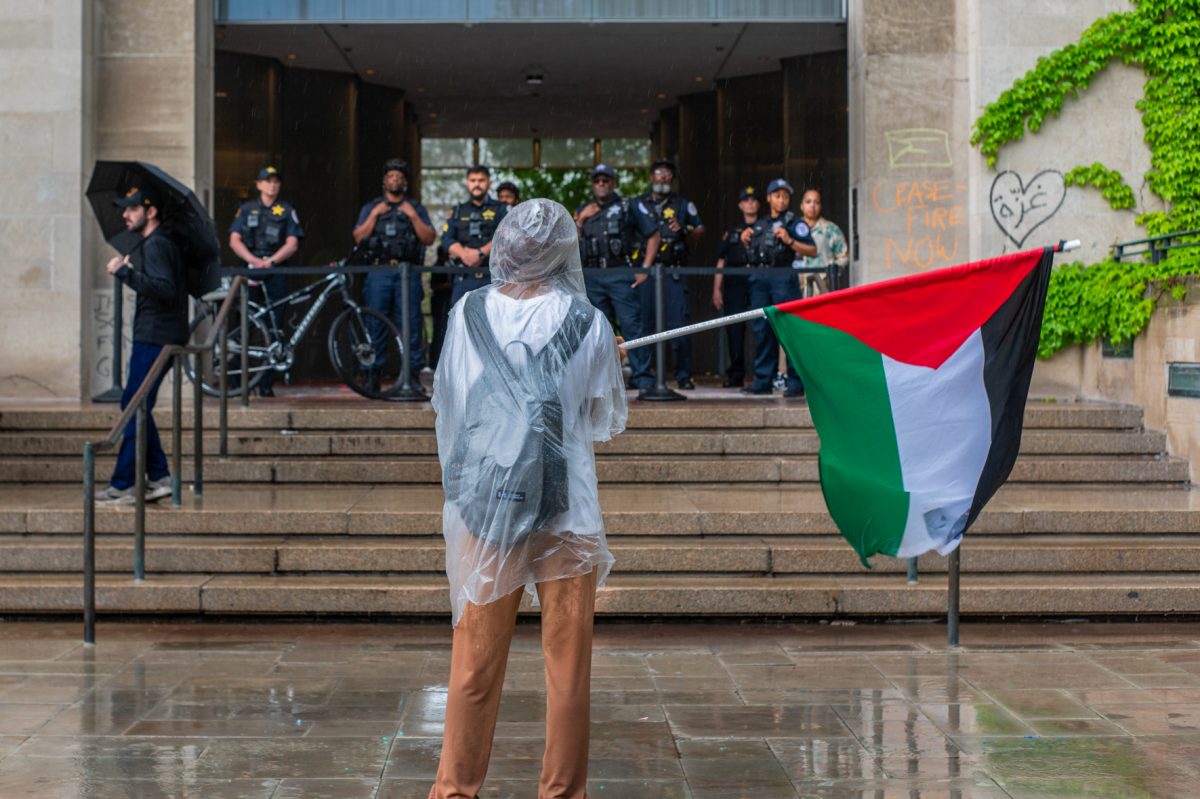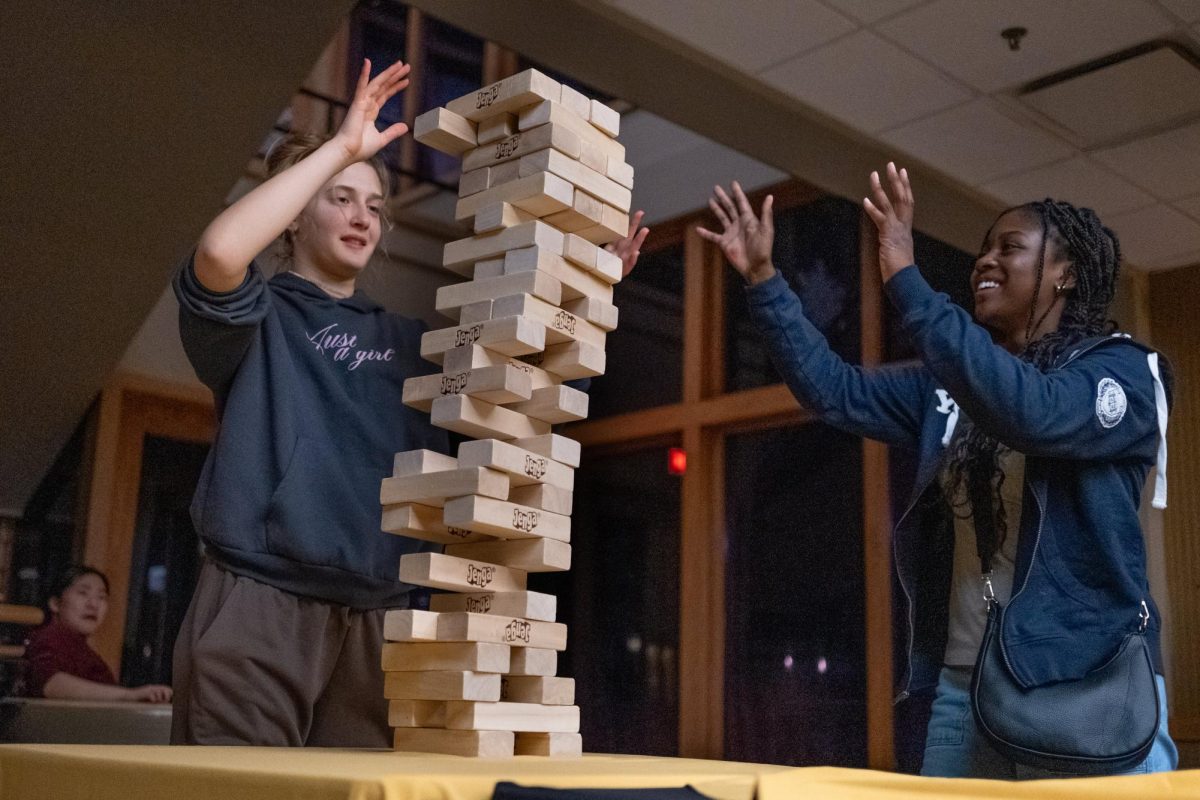Editor’s note: Update, May 7, 6:15 p.m. — The encampment was shut down on the morning of May 7. An updated story is here.
“Disclose, divest — we will not stop, we will not rest.”
This is the last line student protesters chanted at the UChicago encampment rally on Thursday morning, May 2.
On Monday, April 29, UChicago United for Palestine, a student group, began an encampment on the University of Chicago’s Main Quad with the purpose of standing in solidarity with the Palestinian people. University administrators stated that at the time they would tolerate the encampment, even though it violated UChicago policy. On Friday morning, May 3, an email from President Paul Alivisatos declared that the encampments would not be tolerated any longer.
U-High Midway editors spoke with several encampment participants on May 2. In addition to drawing attention to the Israel-Hamas war, the protesters said they are requesting that the university be transparent about where it has investments, divest from funds that support weapons manufacturers and have ties to Israel, and redirect investments toward Chicago’s South Side.
UChicago has long-stated that divestment would violate the Kalven Report, which formalizes the university’s neutrality in political matters. The university has held this position in 2013 during an academic boycott of Israeli universities and in 2016 during a business divestment from Israeli companies.
On May 2, tents of all sizes and colors were scattered across the heart of the quad. Palestinian flags blew in the wind, hanging from tree to tree. Posters, paintings and drawings rested on trees, tents and lamp poles. Watermelon visuals — honoring the red, green and black shades of the Palestinian flag — were scattered throughout the encampment.
This week the UChicago campus experienced graffiti, destruction of a university-approved installation of Israeli flags, and removal of a Palestinian flag that was hung on a flagpole. Unlike other campus encampments that experienced violent interactions, the UChicago campus was nonviolent until May 3.
Miriam, a senior at UChicago who declined to provide her last name, has been part of the encampment since its start and enjoyed the community during the week.
“Everyone here is just so principled and so calm,” Miriam said. “People are very, of course, anxious in case of any escalation on the side of the university and what might happen in case of the cops showing up, but it’s just such a great community.”
Pro-Palestinian protesters like Miriam had camped in tents with posters and their demands for a ceasefire and disinvestment. In addition to the tents, students set up an art section, where they made posters to line the encampment borders, as well as a first aid tent, food area, an information booth and a library. Their placement on the quad had one goal: be in everyone’s face and in everyone’s mind to maximize the spread of their information and impact on the community.
Youssef Hasweh, a UCUP organizer and a senior UChicago student, resides in the center of the tents. He feels the power of this movement mainly because of students that came to UCUP, asking them to organize something.
“I have hope in the fact that I know we’re all doing the right thing and we have the numbers,” Mr. Hasweh said. “Like, this is one of the first times we’ve done an event or an action where the community has asked us to do it. Oftentimes we’re doing actions and we’re asking the community to come out.”
The encampments on many of these college campuses, one of the first major-widespread college protests since the 1960s anti-Vietnam War protests, have been united since the beginning. The UChicago encampment was modeled after nonviolent protests against apartheid in South Africa in the 1980s.
“We’ve been connected since the start,” Mr. Hasweh said. “That’s why in the fall you saw all of us doing sit-ins. All of us did know that there was an encampment happening in Columbia.”
On May 2, Grace, a graduate student in the master’s in social work program who declined to provide her last name, spoke at a teach-in about American Sign Language. She is a deaf student, and worked on teaching her fellow students emergency sign language — which deaf citizens in Palestine need during the war. She also made paintings of some of these citizens, which were displayed at the entrance of the encampment on the quad.
“We are understanding their experiences and thinking about how we can support them and knowing on their side, we see you,” Grace said. “Like, we’re fighting for you, we’re here for you.”
However, the encampments have prompted a national debate over what makes a protest antisemitic. There have been multiple reported incidents of antisemitism at encampments across the country, though their purpose is to protest zionism. Some students have interpreted the UChicago encampment’s messages protesting the existence of Israel to be antisemitic, leading to counter protests on May 3.
In 2023, Amnesty International, an international organization focused on human rights, released a report analyzing the activities of investment offices from the universities with the 10 largest endowments in the United States. The universities were graded on four categories: commitment to responsible investment; environmental, social and corporate governance (ESG) integration and due diligence; stewardship and engagement; and disclosure and transparency. UChicago scored 0/40 points in total, failing to ensure its investments are in accordance with the United Nations Guiding Principles of Human Rights.
According to Miriam, UCUP’s demonstrations are centered around a key idea of the boycott, divestment and sanctions movement. She emphasized the importance of students’ voices being heard.
“You’ve been letting us talk,” Miriam said. “You’ve been letting us have our rallies during specific hours of the day when you allow noise, but freedom of speech is also freedom to be heard and listened to.”
























































Debra • May 3, 2024 at 8:52 pm
Thank you for this helpful reporting!